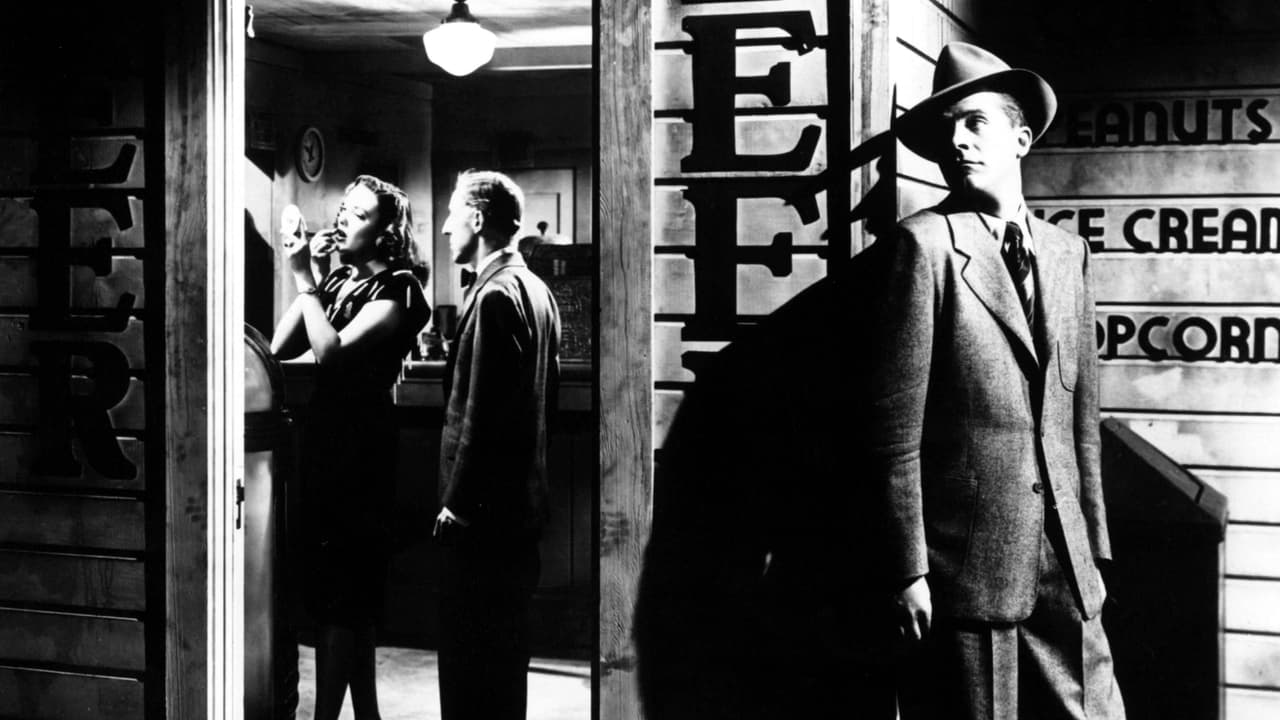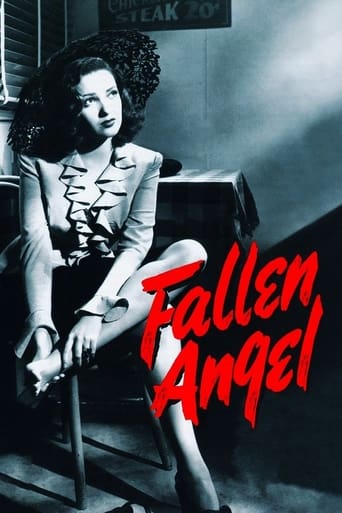

A minor Preminger "noir" following the much superior "Laura". Dana Andrews is Eric, a drifter down on luck, stranded in a small town between Los Angeles and San Francisco. While planning a quick swindle to buy the ticket for San Francisco, Eric gets obsessed with local bad girl Stella (Linda Darnell).Stella is not the archetypal femme fatale because she is not "bad" enough. Although dishonest and greedy, she tries not to get involved with married men and wants only a decent home and husband. However, Darnell plays Stella as a femme fatale, with plenty of make up, tight clothes, attitude and all the boys in town drooling at her sight.Eric's plan to make a quick buck and marry Stella is to seduce and marry first the local rich spinster June, played by Alice Faye. Predictably, spinster June falls for the bad guy and they get married within a week. The plot twist is that Stella, tired of waiting decides to marry another suitor, but ends up dead. Follows the investigation, which should include all men in town. The main problem of the movie is that Eric's character is not very sympathetic - even for noir standards - and does not engage the audience with his passive attitude (as the much superior Swede did, in "The Killers"). June is also quite an annoying, passive-aggressive character. Finally, the small town atmosphere cannot compete with the usual big, dirty town background of classic noir.
... View MoreGrew up with 30s/40s films but somehow missed this one and delighted to have tripped over it on FMC tonight.Despite the 6 stars, highly recommended.Those six stars? Because the movie is split into light and darkness with Darnell as the dark bad girl and Faye as the good light girl. The dark scenes are classic and as good as anything I've ever seen in a Noir; the sparks between Andrews and Darnell are as raw and sexual as you can get short of porn, would have loved to have seen Andrews hands disappear bellow the frame with Darnell mewing her arousal as the heavy breathing dissolves into the imagination and hotter sex than porn could ever deliver.The light scenes are well done and well acted but just don't belong - it's like a totally different movie, a well-done small town Andy Hardy kind of thing.Initially I blamed Faye - great actress, great comedian but no hint of darkness, just the consummate girl-next-door. And that is what she is in the light scenes. But then she had a couple of dark scenes and, while the sparks were different, they were there.So it wasn't Faye and, after reading cfryx's review, I can see what likely happened. Instead of counterpointing Darnell and Faye, Zanuck intervened, highlighted Darnell at Faye's expense, and turned what might have been a 9 star classic into a very interesting but extremely flawed 6. Producers, directors and especially studio heads should be neutered as a condition of employment.
... View MoreA seedy environment, reckless actions and the infatuation of a femme fatale. These elements of film noir are essential in Fallen Angel in portraying a secretly yet deeply morally corrupt society by following the journey of the protagonist.Drifter Eric Stanton finds himself in the town of Walton, a place whose exterior seems wholesome but a number of the residents are the opposite conversing in cafes, dance halls and quiet spots. Most notably local waitress Stella who oozes sexuality just by being in a room evident in her opening scene. As with most male protagonist in film noirs Eric immediacy becomes fixated on the emotionally lethal Stella to the point of becoming involved with a less tainted woman in order to steal money, all as a result of Eric's blind passion for Stella. Delving deeper into their relationship Eric and Stella have common ground; both are searching for their vision of a perfect lifestyle and won't let morals get in the way. It becomes somewhat appealing to see these fragile figures together mixing in their immorality. Yet the visions they both share soon leads them to dark ends.Fallen Angel's plot reaches its core with the murder of Stella evokes dangers for Eric. Whilst the situation turns nasty, Eric runs to safety with June, the less tainted woman he married solely for her money. However this relationship which had been built upon deception turns two dimensional. It offers a great dynamic to Fallen Angel as Eric finally finds the permanency he had been drifting years for in June, whose kind and loving personality leads Eric to a more pure existence. Kudos has to be given to Alice Faye, who makes her performance as June one of heartfelt sentiment that we cheer for her to sway Eric to moral goodness.And with good reason as the climax reveals a senior figure in Walton as the murderer not only gave a pessimistic view of amorality in society but also mirrored how Eric's life could have been if his infatuation with Stella had gotten to more extreme heights. This reflective realisation and the whole dynamic of Eric drifting between the worlds of evil and good make Fallen Angel a provocative character piece.
... View MoreAfter collaborating on one of the greatest films ever made(Laura (1944)), director Otto Preminger and star Dana Andrews this time join forces to make a lesser but nonetheless beautifully photographed film noir titled FALLEN ANGEL. Andrews is on his way to San Francisco, broke, hard-bitten, angry, and tired, from New York where he squandered $8,000 after selling a successful publicity agency(he's good at charming customers into buying whatever he's selling), wandering into a little California town known as Watkins where he's smitten with a no-good beauty named Stella, the kind of chick who hypnotizes all the men who happen to enter her orbit. Andrews is so desperate to have her as his girl, he'll work his spell over a local girl(Alice Faye, receiving top billing), the daughter of a deceased former Mayor, revered by the citizens of Watkins. Faye has money: Darnell wants to have a home and plenty of dough, but when Andrews informs her that he had to marry Faye in order to secure the money she has in a San Francisco bank vault box, their plan to run away together hits the skids. Darnell doesn't want a "married man" and eyes a music box and slot machine salesman (Bruce Cabot), raising the ire of Andrews who has devoted all of his recent activities to pursuing her hand. When later that night Darnell is found murdered, a blow to the temple the method of execution, Andrews is the suspect because he met her at the diner earlier that night, producing the heated incident which ended their relationship for good.Charles Bickford is a retired police investigator who came to Watkins "to relax" from New York, asked by the Police Chief to help him find Darnell's murderer. Bickford's interrogation methods (as we see when he questions Cabot, wearing a white glove to remove potential bruising) are questionable, to say the least, and Andrews gets out of dodge, fearing a frame-up, with Faye insisting on coming to San Francisco with him. Anne Revere is the older sister of Faye, herself emotionally scarred from losing a fortune of her daddy's money to a louse who fleeced her. Revere simply wants what's best for her sister and feels Andrews would commit the same grievous acts perpetrated on her. Shot in stunning, stark B&W by cinematographer Joseph LaShelle, FALLEN ANGEL is blessed with a gorgeous look, and Andrews was trustworthy when it came to performing in the film noir genre. Preminger's film takes its time, allowing the story to unfold, but I'm not quite sold that Faye would adhesively attach to Andrews who never shows her the kind of affection she deserves—that is until the very end when she loyally remains by his side despite angered outbursts on his behalf because of a situation he finds himself in, the chief suspect in a murder. Darnell is perfectly cast as the object of lust all the guys covet and adore. Good part for Percy Kilbride as the old diner owner who practically worships Darnell, so incredibly happy that she continues to work for him(she actually lifts money from his cash register to pocket for herself, but I imagine he wouldn't get rid of her even if he caught her). Darnell's shallow, greedy, a hollow human being whose only attributes are her sultry looks and sexy features and curves. John Carradine has a hilarious cameo as a charlatan called Professor Madley, who claims to commune with the dead—Andrews sees an opportunity with this character to score some quick bread, able to convince Faye to come to a performance, in turn bringing the entire community to see Carradine talk with lost loved ones, preferably their dead mayor.
... View More